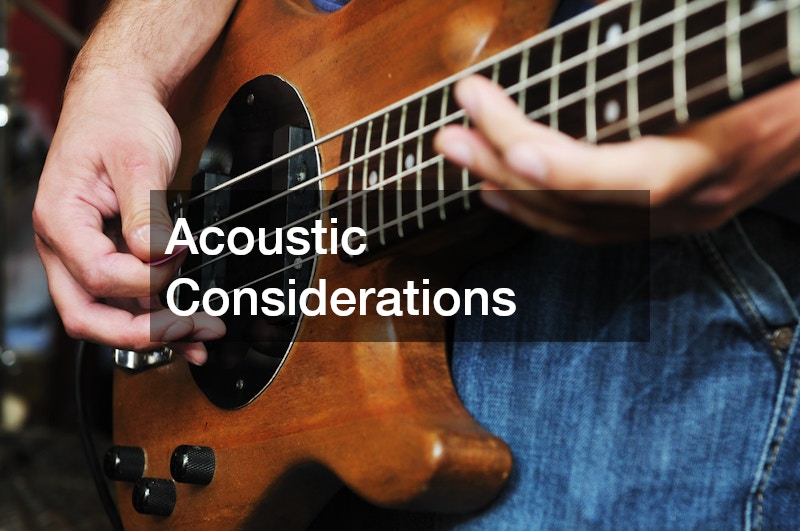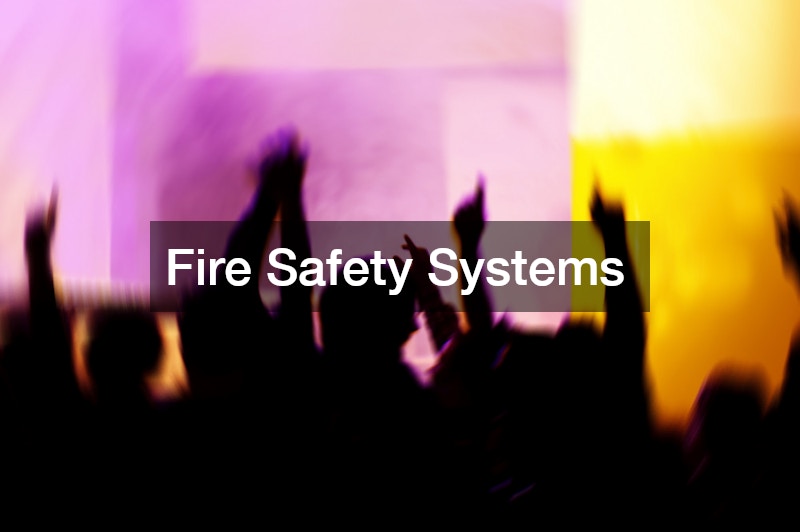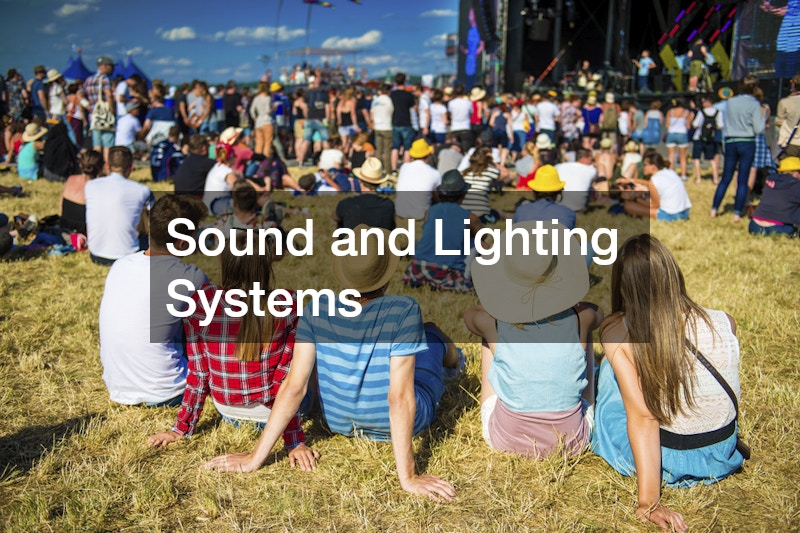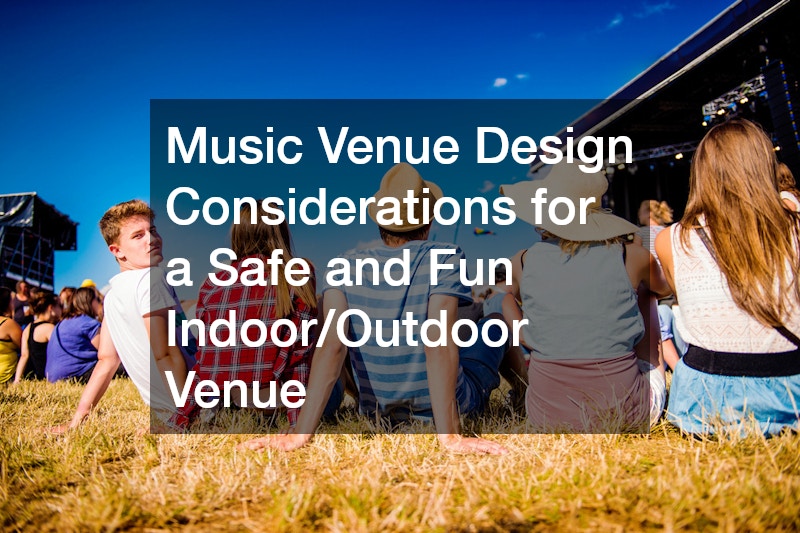
As entertainment experiences evolve, music venues must incorporate cutting-edge technology and thoughtful design elements. By blending these aspects together, venues can ensure that every event is both memorable and secure for attendees. Here are some music venue design considerations!

Acoustic Considerations
Achieving optimal acoustics is crucial for any music venue to enhance the audience experience and performance quality. A commercial general contractor plays a significant role in evaluating and implementing sound design that minimizes reverberations and unwanted echoes. Tailoring the acoustics of a venue involves assessing materials and structures that support the clarity of sound and ensure that each note reaches every corner of the space.
Proper acoustic treatments like diffusers and absorbers are essential to prevent sound distortion and maintain audio integrity. It is imperative for music venues to account for different types of music and events, requiring flexibility in acoustical music venue design. Venues may also employ advanced technologies to dynamically adjust sound settings depending on the performance.
Emergency Exits and Signage
Emergency exits and clear signage are fundamental to ensuring the safety of patrons and staff in music venues. Implementing well-placed exits facilitates swift evacuation and reduces the risk of injury during emergencies. Each egress point must be readily accessible and networked throughout the venue to guide large crowds efficiently.
Signage should be prominent, easily readable, and illuminated to provide clear directions even in low-light environments. Music venues should work extensively with fire safety professionals to comply with all local regulations and standards. Technology can also aid in emergency scenarios, such as GPS systems and apps providing real-time evacuation routes.
Crowd Management Strategies
Effective crowd management is essential for maintaining order and safety in music venues. Considerations include entry and exit flow, ticketing processes, and crowd dispersal strategies to prevent congestion. Consulting with a personal injury law firm can highlight potential liability concerns and inform management protocols.
Technology plays a significant role in modern crowd management, from digital ticketing systems to smart sensors that monitor real-time crowd density. Music venue design must address both indoor and outdoor settings, providing ample space for movement without compromising the ambiance. Security personnel should be strategically positioned to manage access and ensure compliance with venue rules.

Fire Safety Systems
Fire safety systems are indispensable in protecting the safety of patrons, staff, and the facility itself. Music venues must be equipped with modern fire detection and suppression systems, including alarms, sprinklers, and fire extinguishers. Collaboration with fire safety experts ensures full compliance with regulations and successful integration of these systems into the building design.
Regular maintenance and inspections are crucial to guarantee the functionality of fire safety equipment. Venues should establish a schedule to replace outdated components and conduct routine fire safety drills. Staff training on proper evacuation protocols and equipment handling enhances the overall preparedness of the venue.
Proximity to Transportation
The location of a music venue in relation to transportation options can significantly influence its accessibility and appeal. Venues close to major transit routes or with ample parking facilities tend to attract larger crowds due to ease of access. Strategic parcel contract negotiation can be key in acquiring land that balances convenience with other logistical needs.
Collaborations with local transit authorities may yield additional support for event-related shuttle services, enhancing the overall guest experience. Moreover, consideration must be given to the environmental impact of increased traffic; therefore, music venue design is essential to manage carbon footprint and incorporate eco-friendly transit solutions.
Venues that prioritize access also facilitate the of artists and production teams, expediting load-in and load-out processes. Music venues located in high-accessibility areas may benefit from increased patronage due to impulse visitors and guests attending multiple events. Ultimately, a venue’s proximity to transportation adds a competitive edge in today’s crowded entertainment market.
Environmental Impact and Community Relations
Modern music venues have a responsibility to minimize their environmental footprint while fostering positive community relations. Implementing sustainable practices, such as energy-efficient lighting and waste reduction protocols, reflects a venue’s commitment to environmental stewardship. Venues should strive for continual improvement, employing bookkeeping solutions to manage environmental cost-saving measures effectively.
Community engagement initiatives, like open houses and feedback sessions, can strengthen ties with local residents and businesses. Music venues must consider the impact of noise and traffic on surrounding neighborhoods, seeking ways to mitigate disturbances through soundproofing and coordinated event scheduling. Long-term success depends on a venue’s ability to harmonize its operations with the expectations and needs of its community.
Regular updates on sustainability progress foster goodwill and encourage patronage from environmentally conscious guests. Online marketing campaigns can highlight community contributions and initiatives, enhancing the venue’s public image. Maintaining transparency in these efforts builds trust and encourages collaborative problem-solving to meet environmental challenges.

Sound and Lighting Systems
State-of-the-art sound and lighting systems are central to delivering memorable live performances during music venue design. Music venues invest in sophisticated technology to ensure that acoustics and visuals elevate the overall experience. Proper alignment and integration of these systems require the expertise of seasoned professionals and an approach to balancing cutting-edge technology with operational needs.
Concert-goers expect enhanced visual experiences, making it essential for venues to utilize advanced lighting techniques and digital projection systems. Music venues should continuously evaluate and upgrade these systems to align with technological advancements and emerging industry standards. The synergy of sound and lighting can transform a venue’s atmosphere, leaving lasting impressions on patrons.
Continuous staff training and a focus on preventive maintenance ensure consistent performance of these critical systems. By adopting a client focus, venues can tailor sound and lighting configurations to meet the unique needs of each event. Ultimately, investing in superior technology supports the industry reputation of a music venue, attracting high-profile artists and loyal audiences.
Security and Surveillance Enhancements
Security measures are paramount for the safety of all visitors, staff, and performers in music venues. Enhanced surveillance systems combined with strategic personnel placement offer a comprehensive approach to threat detection and prevention. Music venues must assess security needs specific to their layout, size, and event type, adapting solutions to address music venue design efficiently.
The integration of cutting-edge surveillance technologies, such as facial recognition and AI-driven monitoring systems, enhances situational awareness and response capabilities. A partnership with a commercial general contractor skilled in holistic security installations can fortify a venue’s defenses. Routine security audits and incident simulations further bolster preparedness and formulate responsive strategies.
Building a strong rapport with local law enforcement and emergency responders is essential for coordinated action during potential crisis situations. Investing in a robust security framework demonstrates a commitment to safety, creating an inviting atmosphere for both performers and audiences. Adequate security measures are non-negotiable for sustained success and the longevity of any music venue.
ADA Compliance and Accessibility
Ensuring ADA compliance and accessibility is crucial in making music venues inclusive for all patrons. Venues must provide equal access to facilities, including seating areas, restroom amenities, and entryways. Often, consultants with expertise in accessibility guidelines aid in evaluating and implementing these critical design aspects.
Creating a welcoming environment involves continuous assessment and adaptation of physical and digital interfaces to embrace the needs of individuals with disabilities. Targeted website maintenance can improve the online reservation and ticket purchasing experiences, reinforcing accessibility commitments across all touchpoints. Proactive engagement with advocacy groups informs venues of evolving standards and enhances community relationships.
Investment in adaptive technologies and staff training supports a culture of accessibility that extends beyond regulatory compliance. Patron feedback prompts timely modifications to venues, ensuring that music venue design remains an essential focus. This dedication to inclusiveness encourages diverse audiences to engage with events and performances fully.

Balancing Style With Function
Striking a balance between aesthetic appeal and functional utility is a key consideration in music venue design. While stylish interiors and exteriors draw initial attention, functionality ensures sustained operability and guest satisfaction. Engaging the expertise of retail building construction experts can shape spaces that marry these priorities seamlessly.
Design teams should consider venue versatility, allowing for adjustments to accommodate various event types and audience sizes without sacrificing style. Flexible spaces and multipurpose furnishings demonstrate a commitment to design philosophy—consistent attempts to innovate aesthetically within pragmatic constraints set successful venues apart.
Finding this harmonious balance also involves understanding audience demographics and cultural preferences. Venue operators should leverage feedback and data analytics to refine design approaches continuously. A well-balanced venue promotes loyalty and repeat visits from delighted patrons who appreciate both the look and feel of the space.
Branding Through Design
Music venues often serve as cultural landmarks, with their design reinforcing brand identity and market position. Working alongside a branding agency, venues can create visually compelling environments that resonate with their target audience, establishing a recognizable and unique brand presence. Effective use of branded elements throughout the venue enhances cohesiveness and creates memorable experiences.
Branding efforts should extend into online platforms, with online marketing strategies complementing physical elements to engage wider audiences. A successful brand integration considers both visual and interactive components that invite guest participation and loyalty. Coordinated design initiatives lead to increased venue recognition and sustained brand relevance across all touchpoints.
Sustaining brand identity involves aligning venue experiences with communicated brand values, and cultivating a reputation that supports long-term success. The alignment with brand storytelling is critical, creating authenticity and depth in marketing and guest engagement efforts. Music venues that master this blend of design and branding enjoy enhanced visibility and patronage.
Soundproofing Techniques
Proper soundproofing is vital to minimize noise disturbances and enhance acoustic performance within music venues. Advanced techniques involve the use of specialized materials and construction practices to isolate sound and prevent leakage. Music venues must evaluate neighboring structures and the site environment to tailor effective soundproofing measures.
Implementing acoustically engineered barriers, such as walls and ceilings, absorbs noise and prevents external sound infiltrations. Regular assessments ensure that soundproofing installations align with evolving technology and comply with local noise ordinances. A commercial general contractor with soundproofing expertise can provide insights and solutions to address specific music venue design challenges.
Maintaining positive relations with surrounding communities is facilitated by reducing noise pollution, highlighting a commitment to harmony and respect. Continual improvements in soundproofing methodologies support venue sustainability goals and enhance guest experiences. Overcoming sound-related challenges positions venues for success within vibrant and engaged communities.

Waste Reduction Strategies
Music venues can significantly contribute to sustainability efforts by implementing comprehensive waste reduction strategies. By adopting environmentally friendly practices, venues demonstrate a commitment to minimizing environmental impact. Key initiatives can range from recycling programs and composting to sourcing biodegradable materials and reducing plastic usage.
Effective waste management involves collaboration with suppliers and partners to develop solutions that are both cost-effective and environmentally sound. Introducing lawn maintenance featuring native plant landscaping and greywater systems further supports ecological efforts. Engaging audiences in sustainability practices encourages collective accountability and environmental stewardship.
Tracking and reporting on waste reduction progress through bookkeeping solutions ensures transparency and accountability when planning music venue design. Innovative waste reduction strategies improve a venue’s reputation as a responsible corporate citizen. By promoting sustainable practices internally and externally, music venues foster a culture of ecological awareness and responsibility.
Budget Planning and Cost Management
Successful budget planning and cost management form the backbone of all music venue ventures. Identifying and allocating resources effectively allows venues to maintain day-to-day operations while investing in long-term upgrades. Strategic financial planning includes regular cost assessments and refined projections to accommodate fluctuating market conditions.
Collaborating with a commercial general contractor facilitates informed financial decisions, ensuring construction and renovation projects remain within budget. Partnerships with service providers for online marketing, parcel contract negotiation, and others should be evaluated based on cost-effectiveness and value delivery. Engaging stakeholders through transparent financial reporting builds credibility and secures stakeholder confidence.
Flexibility in financial strategies allows venues to adapt to unforeseen challenges and seize opportunities for growth. Regular audits and performance reviews ensure that resource allocation aligns with strategic goals and investment priorities. Efficient cost management supports sustainable venue operations and profitability, preparing venues for evolving industry demands.
Enhancing Engagement Opportunities
Music venues thrive on creating interactive and engaging experiences that captivate audiences. Involving patrons beyond event attendance fosters deeper connections and loyalty. Developing innovative engagement strategies can include mobile applications, personalized content, and virtual participation opportunities.
Enhancing engagement involves executing website maintenance to optimize visitor interaction, navigational ease, and comprehensive event information. Integrating social media platforms and online marketing channels expands reach and amplifies engagement efforts. Personalization in communication reinforces patron connection, making each visitor feel valued and appreciated.
Leveraging data analytics supports tailored outreach efforts, facilitating targeted marketing initiatives that resonate with patrons. Establishing robust channels for guest feedback and suggestions helps venues refine offerings and adopt responsive practices. Music venues that prioritize genuine engagement strategies enjoy increased patronage and brand advocacy.
Embracing these comprehensive music venue design considerations not only ensures the safety and satisfaction of patrons but also secures success. By committing to meticulous planning and continuous improvement, music venues can thrive in an ever-evolving industry and stay at the forefront of entertainment experiences.

